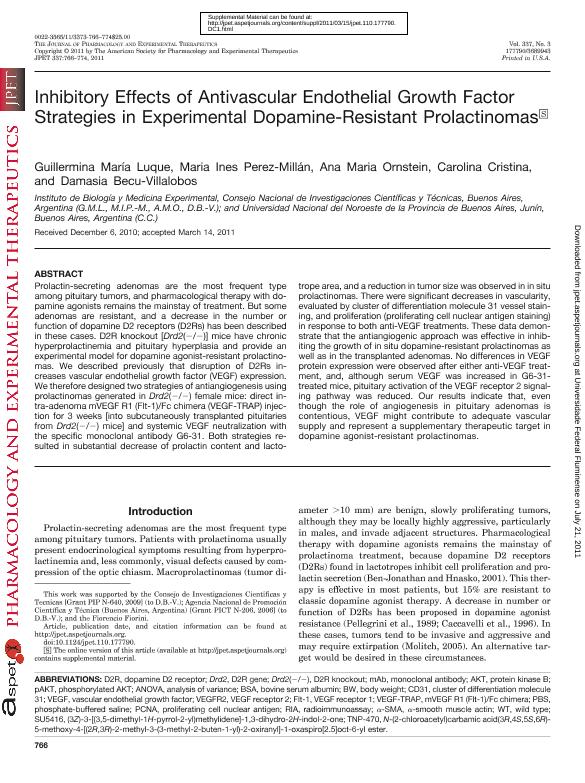Artículo
Inhibitory effects of anti-Vascular Endothelial Growth Factor strategies in experimental dopamine resistant prolactinomas
Luque, Guillermina Maria ; Pérez Millán, María Inés
; Pérez Millán, María Inés ; Ornstein, Ana Maria
; Ornstein, Ana Maria ; Cristina, Carolina; Becu, Damasia
; Cristina, Carolina; Becu, Damasia
 ; Pérez Millán, María Inés
; Pérez Millán, María Inés ; Ornstein, Ana Maria
; Ornstein, Ana Maria ; Cristina, Carolina; Becu, Damasia
; Cristina, Carolina; Becu, Damasia
Fecha de publicación:
06/2011
Editorial:
American Society for Pharmacology and Experimental Therapeutics
Revista:
Journal Of Pharmacology And Experimental Therapeutics
ISSN:
0022-3565
e-ISSN:
1521-0103
Idioma:
Inglés
Tipo de recurso:
Artículo publicado
Clasificación temática:
Resumen
Prolactin-secreting adenomas are the most frequent type among pituitary tumors, and pharmacological therapy with dopamine agonists remains the mainstay of treatment. But some adenomas are resistant, and a decrease in the number or function of dopamine D2 receptors (D2Rs) has been described in these cases. D2R knockout [Drd2(-/-)] mice have chronic hyperprolactinemia and pituitary hyperplasia and provide an experimental model for dopamine agonist-resistant prolactinomas. We described previously that disruption of D2Rs increases vascular endothelial growth factor (VEGF) expression. We therefore designed two strategies of antiangiogenesis using prolactinomas generated in Drd2(-/-) female mice: direct intra-adenoma mVEGF R1 (Flt-1)/Fc chimera (VEGF-TRAP) injection for 3 weeks [into subcutaneously transplanted pituitaries from Drd2(-/-) mice] and systemic VEGF neutralization with the specific monoclonal antibody G6-31. Both strategies resulted in substantial decrease of prolactin content and lactotrope area, and a reduction in tumor size was observed in in situ prolactinomas. There were significant decreases in vascularity, evaluated by cluster of differentiation molecule 31 vessel staining, and proliferation (proliferating cell nuclear antigen staining) in response to both anti-VEGF treatments. These data demonstrate that the antiangiogenic approach was effective in inhibiting the growth of in situ dopamine-resistant prolactinomas as well as in the transplanted adenomas. No differences in VEGF protein expression were observed after either anti-VEGF treatment, and, although serum VEGF was increased in G6-31-treated mice, pituitary activation of the VEGF receptor 2 signaling pathway was reduced. Our results indicate that, even though the role of angiogenesis in pituitary adenomas is contentious, VEGF might contribute to adequate vascular supply and represent a supplementary therapeutic target in dopamine agonist-resistant prolactinomas.
Palabras clave:
Prolactinoma
,
Antiangiogenesis
,
Vegf-Trap
,
Mab G6-31
Archivos asociados
Licencia
Identificadores
Colecciones
Articulos(IBYME)
Articulos de INST.DE BIOLOGIA Y MEDICINA EXPERIMENTAL (I)
Articulos de INST.DE BIOLOGIA Y MEDICINA EXPERIMENTAL (I)
Citación
Luque, Guillermina Maria; Pérez Millán, María Inés; Ornstein, Ana Maria; Cristina, Carolina; Becu, Damasia; Inhibitory effects of anti-Vascular Endothelial Growth Factor strategies in experimental dopamine resistant prolactinomas; American Society for Pharmacology and Experimental Therapeutics; Journal Of Pharmacology And Experimental Therapeutics; 337; 3; 6-2011; 766-774
Compartir
Altmétricas



